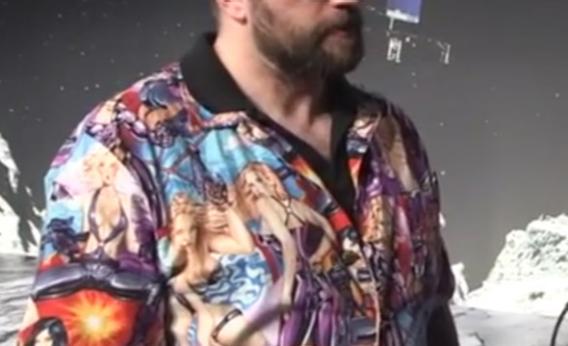Create a free profile to get unlimited access to exclusive videos, sweepstakes, and more!
Shirtstorm

Last week, the European Space Agency landed a space probe on a comet. It was big news—historic, even.
But another event caused a stir at the same time, tangentially related to the event. Matt Taylor, the Rosetta mission’s project scientist, went on the air to talk about the successful landing. However, his choice of attire was unfortunate.
He was wearing a bowling shirt covered in pinup-style drawings of scantily clad women.
This upset a lot of people. A lot. It was compounded by his extremely poorly thought-out description of the difficulty of the Rosetta mission: “She’s sexy, but I never said she was easy.”
Yikes. To be clear, I don’t think Taylor is a raging misogynist or anything like that; I think he was just clueless about how his words might sound and his shirt might be interpreted. We all live in an atmosphere steeped in sexism, and we hardly notice it; a fish doesn’t notice the water in which it swims. I’ve lived in that environment my whole life, and I was well into adulthood before I started becoming aware of it and figuring out how to counter it. I’m still learning.
Importantly, the next day, clearly upset he had caused such a fuss, Taylor apologized on air sincerely and graciously for his actions. For the most part, the people who were upset accepted his apology and moved on.
But it doesn’t end there. As you might expect, when people complained about the casual sexism of the shirt and the mission description, a frothing torrent of backlash misogyny swept over social media, another in a long line of demonstrations of Lewis’ law (“Comments on any article about feminism justify feminism.”)
There is much I could say here, but Dr24Hours wrote an excellent summary that aligns fairly well with my thinking. Please go read that right now.
But I have something to add.
If you think this is just women complaining, you’re wrong. Certainly many have, and rightly so. But the fact is, I’m writing about it. I can point you to many men, friends of mine, scientists and science communicators all, who have spoken up about it. It’s important that men speak up, and it’s important that we listen, too.
If you think this is just complaining from wannabes who can’t hold a candle to someone who just landed a probe on a comet, you’re wrong. Talk to my friend, the cosmologist Katie Mack. Or the planetary scientist Sarah Horst. Or geologist Mika McKinnon. Or astrophysicist Catherine Q.* Or planetary geologist Emily Lakdawalla. Or radio astronomer Nicole Gugliucci. Or professor and science communicator extraordinaire Pamela Gay. Or Carolyn Porco, who worked on the Voyager mission and is the leader of the Cassini imaging team, the space probe that’s been orbiting Saturn for over a decade now.
If you think this is just a bunch of prudes, you’re wrong. It’s not about the prurience. It’s about the atmosphere of denigration.
If you think it’s OK to use a misogynistic gender-charged word to insult and demean a woman because she used a generic nongender-charged insult about a man, then you’re really wrong (and that’s one representative tweet from many I saw just like it).
If you think this isn’t a big deal, well, by itself, it’s not a huge one. But it’s not by itself, is it? This event didn’t happen in a vacuum. It comes when there is still a tremendously leaky pipeline for women from undergraduate science classes to professional scientist. It comes when having a female name on an application to do research at a university makes it less likely to get accepted,† and have your research paper cited less. It comes when there is still not even close to parity in hiring and retaining women in the sciences.
So yeah, it’s just a shirt.
And it’s just an ad.
It’s just a saying.
It’s just a TV show.
It’s just the Internet.
Yes, but you almost make as much as a man does.
It’s just a catcall.
It’s a compliment!
It’s just that boys will be boys.
It’s just that she’s a slut.
It’s just that your dress is too short.
It’s just that we want to know what you were wearing at the time, ma’am.
It’s just it’s just it’s just.
It’s just a death by a thousand cuts. No one cut does the deed. In the end, they all do.
* Update, Nov. 18, 2014 at 03:00 UTC: I can't believe I forgot to add my friend Catherine Q to the list of scientists who spoke up about all this. She's on that list now.
† Correction, Nov. 19, 2014: I originally misstated that having a female name on a paper made it less likely to be published. The research showed that having a female name on a research job application to a university made it less likely to be accepted.


























